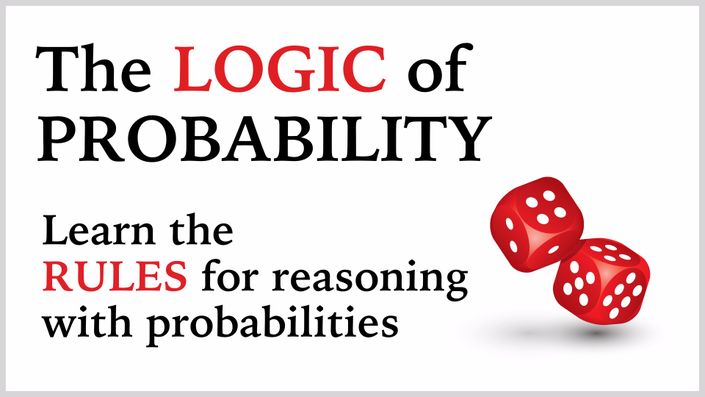
The Logic of Probability
Learn the Rules for Reasoning With Probabilities (including Bayes' Rule)
Watch Promo
NOTE: This course is included in the site-wide bundle which unlocks every course in the Academy.
In the course "What is Probability?" we looked at different interpretations of the probability concept. In that course I often referred to the “probability calculus”, or the “mathematical theory of probability”. This is what most people are talking about when they refer to “probability theory”.
Probability theory provides basic rules for reasoning with probabilities. Given probabilities for events A and B, we can calculate the probability of “A and B”, “A or B”, “A given B”, and so on. These rules are part of our modern understanding of how we ought to reason about uncertainty. In this respect they function in a way similar to the rules of deductive propositional logic, which tell us how we ought to reason with truth-preserving inferences that involve conjunctions, disjunctions, conditionals, etc. This is why it is also natural to talk about the "logic" of probability.
Critical thinking literacy requires that we be at least somewhat familiar with probabilistic relationships.
What Will I Learn in This Course?
In this course you'll learn:
- important preliminary concepts about how to interpret probability relationships
- the basic rules for reasoning with probabilities
- worked examples illustrating how to perform elementary probability calculations
- an introduction to Bayes' Rule and Bayesian reasoning
What Do I Get With This Course?
When you enroll in this course you get
- 12 video lectures, totaling 58 minutes of viewing time
- Full transcripts for each of the lectures, embedded below the videos
- Discussion comments for each of the lectures, allowing you to ask and respond to questions and comments
- Quiz questions to help test your understanding of the concepts
- A pdf ebook suitable for printing or viewing on a desktop computer or tablet device
I'm sometimes asked if the course on Probability Fallacies requires this one as a prerequisite. The answer is "no, but it helps if you want a deeper understanding". I created the Probability Fallacies course to be self-contained, but someone who is familiar with the rules of probability will have a better appreciation of some of the fallacies discussed in that course.
